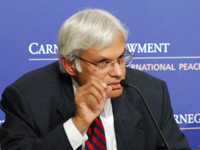Registration
You will receive an email confirming your registration.
IMGXYZ1323IMGZYXThe current economic crisis has had profound effects on the regional balance of power in Asia. Some countries, like Japan, are struggling to overcome sluggish economic growth while others, like China, have benefited from a quick and effective response. The National Bureau of Asian Research’s Strategic Asia 2009-10: Economic Meltdown and Geopolitical Stability analyzes the crisis’ impact on key Asian states and explores the strategic implications for the United States.
Co-editor Ashley Tellis moderated a discussion between several of the book’s contributors, including Carnegie’s non-resident scholar, Pieter Bottelier.
Crisis Impacts
- Capitalism: The economic crisis did not fundamentally damage capitalism’s role in the global economic system. Capitalism, Tellis said, is enormously flexible. While the aftermath of the crisis may lead to more regulation, history suggests the pendulum will eventually swing back.
- China’s Growth: China should expect to see continued growth of 8-9% this year. If current trends persist, within twenty years, China will have the same economic power as the United States. Its fiscal situation has been well-managed and its banks are strong, both of which Bottelier contended have helped protect the country from the crisis’ disastrous effects.
- China’s Surplus: Although global imbalances in consumption and savings and imperfect exchange rates contributed to the meltdown, China cannot be considered “co-responsible” for the crisis. China’s current account surpluses, Bottelier argued, are derived from its exceptionally high productivity growth in manufacturing, not deliberate currency undervaluation aimed at stimulating exports.
- India: Sanjaya Baru claimed that, in contrast to popular belief, the crisis did have an impact on India, specifically in its globally integrated financial industry. But like China, India did not experience as serious a decline in economic growth as the IMF had predicted. Indian trade, for example, was not as adversely affected by the crisis because of India’s conservative economic policies.
- Japan: Japan remains the worst-hit industrialized state by the crisis, explained Grimes. Although Japan previously enjoyed a solid financial base and acted as a responsible global citizen, the crisis wiped out foreign demand for Japanese goods and wreaked disaster on its economy.
- Russia: Russia has experienced a decline in the strength of regional governments and corruption remains rampant. Due to the decreasing price of oil and Russia’s dependency on it, Steven Halliwell argued that there is little chance of industrial restructuring, which is necessary for stable and sustained recovery.
Implications for U.S. Policy
- Tellis urged the United States to look beyond the immediate challenges to U.S. economic hegemony and focus on medium-term challenges, including a non-inflationary exit from stimulus spending and global imbalances in consumption and savings rates.
- China’s rise as a world power has been heightened by the crisis, owing to its quick, strong, and effective response. The United States must recognize this reality, and prepare to meet Beijing as a rising power.
- India is concerned about a growing trade dependency on China and is looking to expand commercial ties with the West, which the United States should encourage.
- As Japan’s opportunity for regional economic leadership has passed, Grimes suspected that it will vie for leadership in the financial industry. The United States should support these efforts
ORDER THIS BOOK: Strategic Asia 2009-10: Economic Meltdown and Geopolitical Stability, is available to order from NBR.
